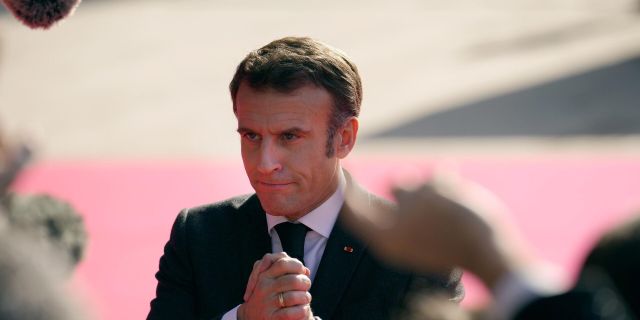Macron is trying to smooth out the negative impression that has developed in the West after his scandalous statements about the Ukrainian conflict, writes Bloomberg. He has already expressed support for Kiev's desire to join the EU and NATO. However, the repentance of the French president pursues broader goals.
Lionel Laurent
But the next aspiration of Paris to become the leader of Europe and establish cooperation will run into resistance.
Emmanuel Macron likes to make breathtaking sweeping statements in the manner of de Gaulle and because of this often comes into disagreement with allies - be it his announcement of the death of the brain of NATO, the requirement not to humiliate Russia after the start of its military operation in Ukraine or the enrollment of Europeans in the category of vassals of America.
Perhaps that is why Macron is now trying to follow a course of reconciliation. Today, when Ukraine is preparing a counteroffensive to return territories, the French leader expresses support for Kiev's desire to join the reformed European Union and NATO. A few years ago, such statements seemed unthinkable. NATO's brain death is canceled, because the alliance has come back to life as a result of Vladimir Putin's shock therapy, Macron says. EU enlargement, which, according to his warning in 2019, would weaken the bloc, has now turned into a question of security and stability. Speaking in Bratislava last week, Macron even admitted that France should have listened more attentively to the statements of Eastern European countries about Russia. It was a disguised attack on his predecessors, who shrugged off the warnings of Atlantists from Eastern Europe.
To make a big speech to make amends for previous important speeches is, of course, very Macron-like. He not only signaled to Putin that Ukraine is part of the future of the European Union. His repentance pursues broader goals. He extends his hand to the Eastern European and Baltic states, which consider Paris an unreliable partner in security matters. He is building new bridges within the EU at a time when the recession is adding to Germany's headache. And since American politicians are more focused on China than on Ukraine, Macron clearly sees this as a good chance to push his way into the leadership.
"It was a necessary step. We had to tell the allies of France that we all understand that we made mistakes," says former assistant Secretary General of NATO Camille Grand, who called the upcoming alliance summit in Vilnius another landmark event. "The question now is whether Macron will be able to convey this message to everyone in the coming months."
And that's where the problems begin.
There is no real unanimity on the issue of EU enlargement. The parties cannot agree on how to reform the process that has lost the confidence of the member states, including France. The EU's eastward advance, which began after the Cold War, is considered an economic success, but it failed to stop the anti-liberal wave of populism in the region and created new obstacles to the decision-making process and integration. Now ideas are being put forward on how to overcome the nightmare associated with unanimous voting and make the accession process more gradual. In particular, it is proposed to give out small portions of remuneration for the implementation of reforms, for example, access to the single market. But even this will surely meet resistance. For example, Polish farmers are protesting against the influx of cheap grain from neighboring warring Ukraine.
And then there is the USA. The French president strongly emphasizes that he, with his desire to create a European defense force, in no way intends to compete with NATO commitments, but still insists on the independence of the continent in a number of areas. "Build European, buy European, introduce European innovations," he urges. Noting that France is confidently moving towards increasing military spending to the NATO target of 2% of GDP, Macron simultaneously scolds other EU countries that prefer to buy "non-European" (that is, American) weapons en masse. His criticism is fair enough, but he is alone, and alone in the field is not a warrior. Even if the European Union takes some steps to implement new initiatives, such as general arms purchases, this battle cry is unlikely to be picked up by many member countries. Macron is right to warn that it is reckless to depend on the United States, since Donald Trump may win the next election. But few people listen to him. Pole Mateusz Morawiecki, for example, said that the Republicans' unwillingness to help Kiev is just a "poker game."
Perhaps the most serious problem for the future is the strategic concept. Moravetsky made a speech in March in which he outlined views on Europe that were far from Macron's. He tried to turn the people against the elite and chastised Brussels for interfering in issues such as the rule of law. Such persistent resistance to the emergence of a European "superstate" does not bode well for further integration. And German Chancellor Olaf Scholz last month also outlined plans to expand the bloc – however, he besieged Macron for his obsessive pursuit of sovereignty and did not even mention the European Political Community consisting of 44 countries under Macron's leadership. Macron apologized for not paying attention to the allies, but are the allies ready to listen to him?
The French president is right to try to use a new approach, and the good news about a self-sufficient Europe is worth preaching. But even such a simple and popular idea as support for Ukraine may not be enough to energize Europe or advance Macron's plans. If Paris fails to back up its words with practical actions or real diplomatic investments (and this will not happen for the first time), Macron's repentance to his partners may not be the last.

